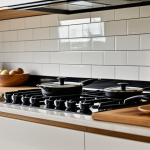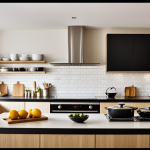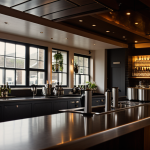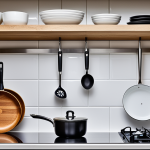Immediate Impact of Technology on UK Kitchen Functionality
Technology has revolutionised kitchen functionality across the UK, fundamentally changing how families prepare meals and manage daily routines. The rise of modern kitchen technology, such as smart appliances and connected kitchen tools, has enhanced convenience significantly. For example, smart ovens now allow precise temperature control and cooking time adjustments remotely, which reduces the risk of overcooking or undercooking.
This shift in technology has streamlined meal preparation, making it faster and more efficient. Connected devices integrate seamlessly with users’ smartphones, enabling recipe guidance, ingredient tracking, and even voice-operated commands. As a result, UK households are experiencing a more efficient and enjoyable cooking experience, tailored to individual preferences.
Also to discover : How are personalization options transforming UK kitchen interiors?
Moreover, these innovations contribute to an overall improvement in convenience. Tasks that were once time-consuming, such as preheating appliances or monitoring cooking progress, can now be automated or controlled remotely. This immediate impact highlights a significant transformation within UK kitchens, with technology driving increased ease of use and fostering smarter, time-saving solutions that align perfectly with modern lifestyle demands.
Core Technological Innovations Shaping Modern UK Kitchens
Modern kitchen technology is rapidly advancing through the integration of smart kitchen appliances and connected devices, transforming UK kitchen functionality. Smart ovens, fridges, and dishwashers now communicate with users via apps, allowing remote control and monitoring. For example, a smart fridge can notify users about expiring groceries, helping reduce waste, while app-controlled ovens ensure perfectly timed meals.
Also to see : How Are Modern British Kitchens Evolving to Meet Sustainability Goals?
Voice assistants, such as Alexa or Google Assistant, further enhance kitchen innovations by enabling hands-free control. UK households increasingly rely on these devices to set timers, adjust appliance settings, or access recipes while cooking, improving convenience significantly.
Real-life adoption demonstrates the practical benefits of connected devices. Families report reduced meal preparation time and greater ease in managing kitchen tasks. Kitchen innovations also extend to integration with smartphones, ensuring seamless coordination across appliances.
This shift to smart kitchen appliances is not just about convenience: it’s about creating a more responsive, efficient, and user-friendly kitchen environment. These technological advancements directly contribute to enhanced kitchen functionality and mark a definitive evolution in how UK families interact with their kitchens daily.
Transformation in Kitchen Design and Layout
Modern kitchen design in the UK is being reshaped by technology-driven kitchens, reflecting a shift from traditional layouts to more flexible, space-saving arrangements. As kitchens become multifunctional hubs, space efficiency is paramount. This is achieved through integrated appliances and clever storage solutions that minimise clutter without sacrificing functionality.
Charging stations and integrated screens are now common features, supporting the use of mobile devices and voice assistants directly in the cooking space. These additions allow users to follow recipes, control appliances, and manage smart home functions seamlessly, enhancing overall kitchen functionality.
Compared to traditional kitchens, which often separated different tasks into fixed zones, technology is enabling more fluid, adaptable spaces that cater to varied cooking styles and family needs. The trend toward open-plan kitchens also reflects this flexibility, promoting connectivity between cooking, dining, and socialising areas.
In summary, UK kitchen design embraces innovation by combining technology with thoughtful layouts, resulting in efficient, user-friendly environments that accommodate modern lifestyles and technological advances. This evolution marks a clear departure from conventional setups, prioritising both form and function.
Immediate Impact of Technology on UK Kitchen Functionality
The rise of modern kitchen technology in UK homes has significantly reshaped kitchen functionality. Smart appliances like connected ovens and refrigerators streamline meal preparation by automating tasks that once required constant attention. For instance, smart ovens adjust cooking times and temperatures dynamically, improving accuracy and reducing waste.
This technological evolution also shifts daily routines. Families benefit from enhanced convenience, as smart fridges notify users about stock levels and expiration dates, prompting timely shopping and reducing food waste. Connected kitchen tools allow users to control devices remotely or via voice commands, making multitasking easier and reducing kitchen-related stress.
Overall, these innovations foster a more efficient, user-friendly environment. The immediate impact lies in simplifying complex cooking processes, cutting down preparation time, and enabling tailored meal management. The integration of these technologies in UK kitchens aligns perfectly with busy modern lifestyles, ensuring both convenience and improved outcomes in everyday cooking. By embracing these tools, UK households experience a tangible uplift in kitchen functionality and enhanced ease of use.
Immediate Impact of Technology on UK Kitchen Functionality
Modern kitchen technology has sparked profound UK kitchen changes, notably through the widespread use of smart appliances and connected kitchen tools. These innovations have revolutionised kitchen functionality by making meal preparation more efficient and adaptable to busy lifestyles. For example, smart fridges with inventory tracking and connected ovens that allow remote temperature adjustments simplify routine tasks, making cooking less time-intensive.
This technological shift also transforms daily routines. UK families experience enhanced convenience as many kitchen tasks are automated or remotely controlled. Voice commands or smartphone apps enable multitasking, allowing users to focus on other activities while meals cook perfectly. This integration directly impacts time management and reduces the stress associated with traditional cooking methods.
The immediate effect is clear: modern kitchen technology improves ease of use and streamlines workflows. Meal preparation becomes faster and more precise, reducing food waste and optimising energy use. The connected nature of devices promotes responsiveness within the kitchen environment, allowing families to adapt recipes or appliance settings quickly, reflecting a significant advancement in how UK kitchens function daily.
Immediate Impact of Technology on UK Kitchen Functionality
Modern kitchen technology drives significant UK kitchen changes by introducing smart appliances and connected kitchen tools that reshape how families handle cooking tasks. The rise of these devices, including app-controlled ovens and inventory-tracking fridges, has transformed traditional meal preparation into a more efficient process. Remote control capabilities allow users to monitor and adjust cooking parameters on the go, reducing time spent in the kitchen and improving outcome accuracy.
This shift influences daily routines by automating many steps previously done manually. Questions arise: How exactly does this enhance kitchen functionality? The answer lies in convenience—tasks like preheating or checking food status no longer demand constant attention. Voice commands and smartphone interfaces facilitate multitasking, allowing users to focus elsewhere while appliances manage themselves.
Additionally, the integration of these technologies improves ease of use, particularly benefiting busy households by reducing cooking-related stress and supporting healthier eating habits through consistent meal quality. Consequently, the overall kitchen functionality improves noticeably, reflecting a clear advancement in the way UK families engage with their kitchens, blending technology seamlessly into everyday cooking.
Immediate Impact of Technology on UK Kitchen Functionality
Modern kitchen technology, through the rise of smart appliances and connected kitchen tools, has transformed kitchen functionality across the UK. Smart ovens, refrigerators, and other devices now communicate via apps or voice commands, significantly enhancing the speed and accuracy of meal preparation. This change leads directly to greater efficiency, reducing time spent monitoring cooking and minimising food waste.
How exactly does this impact daily routines? Households find their workflows streamlined as many manual tasks become automated or remotely controllable. For example, preheating can be triggered from a smartphone, and inventory alerts from smart fridges guide timely shopping. Consequently, convenience improves, supporting multitasking and freeing users from constant kitchen oversight.
Ease of use is another key benefit, as these technologies adapt to user preferences and simplify complex tasks. This fosters a less stressful cooking environment, especially valuable for busy families managing multiple responsibilities. Overall, these UK kitchen changes deliver a substantial uplift in functionality by making kitchens more adaptive, efficient, and tailored to contemporary lifestyles. This immediate impact defines the ongoing evolution toward smarter cooking spaces nationwide.





